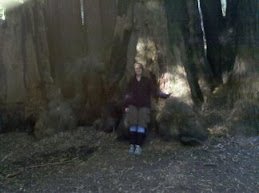One of the continuing education classes that Jen and I are taking right now is a weekly brain development series. It is based on the work of Dr. Bruce Perry and the ChildTrauma Academy. This Wednesday we focused on Neglect, and how it impacts the developing brain. A neurological definition of neglect is “…neglect occurs when the important neural systems in the brain do not receive sufficient quantities and patterns of stimulation required for those systems to develop normally.” In other words, what would be neglect at one point in a child’s life, would not be neglect at another time, depending on what patterns of stimulation a child’s brain is needing at a particular moment in time.
This is different than the legal definition of neglect, which has to do with child abuse. Often this legal form of neglect does not happen in isolation of other forms of child abuse, and so the two often become almost synonymous. In our class we did cover this more traditional definition of neglect. Dr. Perry talked about how lack of stimulation of our senses can atrophy the brain. We saw MRIs of a normal three year old and a neglected three year old and saw how much smaller the later was. And while all of this is fascinating and important to know, this is not the information that excited me.
“Universal neglect” and “social and cultural de-evolution” are what caught my attention. Dr. Perry says that if you look at our brain in an anthropological context, we now have a culture that is socially and culturally malnourished. We have stratified ourselves down into smaller and smaller, more homogenized units until the average household size is now less than three. Our handouts have a graph that show the average household size in 1500’s was twenty, in 1850 it was ten, in 1960 it was five, and we keep dropping. We keep infants at home alone with one or two care takers, our elders are in separate living facilities, we keep children age stratified in our schools and in their extra-curricula, structured activities, and we over-schedule our lives and our children’s lives. A large chunk of our non-scheduled time is taken up by TV, and no matter how varied the programming is, the brain chalks all TV up as only one type of experience.
What all of this adds up to is an anorexic social and cultural experience for our brains. For adults, this is not a healthy thing. For babies and children, this is devastating. Perry says, “The genetic potential for healthy socio-emotional functioning—to be empathic, to share, to invest in the welfare of the community—is better expressed in children living in hunter-gatherer bands or extended families or close-knit communities in comparison with our compartmentalized modern world.” This is what Dr. Perry calls Universal Neglect. Our culture as a whole does not provide “…sufficient quantities and patterns of stimulation required…” for our brains to develop normally.
Pretty depressing stuff, in one way. And yet it is also exhilarating, identifying a source for our universal unrest, our apathy, our sense that things just aren’t right, even when we seem to have everything. Now we know a major cause is that our brains are, literally, starving. We are starving for more and varied relationships, we are starving for multiple deeper relationships. We are starving for community, real community built on continuing, multiple, diverse, and meaningful interactions and experiences. Identifying a cause allows us a place to begin again, and that is a hopeful thing.
I have been saying this for years, and it was just nice to see that the latest brain research backs me up:)
This is different than the legal definition of neglect, which has to do with child abuse. Often this legal form of neglect does not happen in isolation of other forms of child abuse, and so the two often become almost synonymous. In our class we did cover this more traditional definition of neglect. Dr. Perry talked about how lack of stimulation of our senses can atrophy the brain. We saw MRIs of a normal three year old and a neglected three year old and saw how much smaller the later was. And while all of this is fascinating and important to know, this is not the information that excited me.
“Universal neglect” and “social and cultural de-evolution” are what caught my attention. Dr. Perry says that if you look at our brain in an anthropological context, we now have a culture that is socially and culturally malnourished. We have stratified ourselves down into smaller and smaller, more homogenized units until the average household size is now less than three. Our handouts have a graph that show the average household size in 1500’s was twenty, in 1850 it was ten, in 1960 it was five, and we keep dropping. We keep infants at home alone with one or two care takers, our elders are in separate living facilities, we keep children age stratified in our schools and in their extra-curricula, structured activities, and we over-schedule our lives and our children’s lives. A large chunk of our non-scheduled time is taken up by TV, and no matter how varied the programming is, the brain chalks all TV up as only one type of experience.
What all of this adds up to is an anorexic social and cultural experience for our brains. For adults, this is not a healthy thing. For babies and children, this is devastating. Perry says, “The genetic potential for healthy socio-emotional functioning—to be empathic, to share, to invest in the welfare of the community—is better expressed in children living in hunter-gatherer bands or extended families or close-knit communities in comparison with our compartmentalized modern world.” This is what Dr. Perry calls Universal Neglect. Our culture as a whole does not provide “…sufficient quantities and patterns of stimulation required…” for our brains to develop normally.
Pretty depressing stuff, in one way. And yet it is also exhilarating, identifying a source for our universal unrest, our apathy, our sense that things just aren’t right, even when we seem to have everything. Now we know a major cause is that our brains are, literally, starving. We are starving for more and varied relationships, we are starving for multiple deeper relationships. We are starving for community, real community built on continuing, multiple, diverse, and meaningful interactions and experiences. Identifying a cause allows us a place to begin again, and that is a hopeful thing.
I have been saying this for years, and it was just nice to see that the latest brain research backs me up:)


